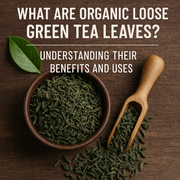How to Brew Loose Leaf Organic Tea: A Step-by-Step Guide
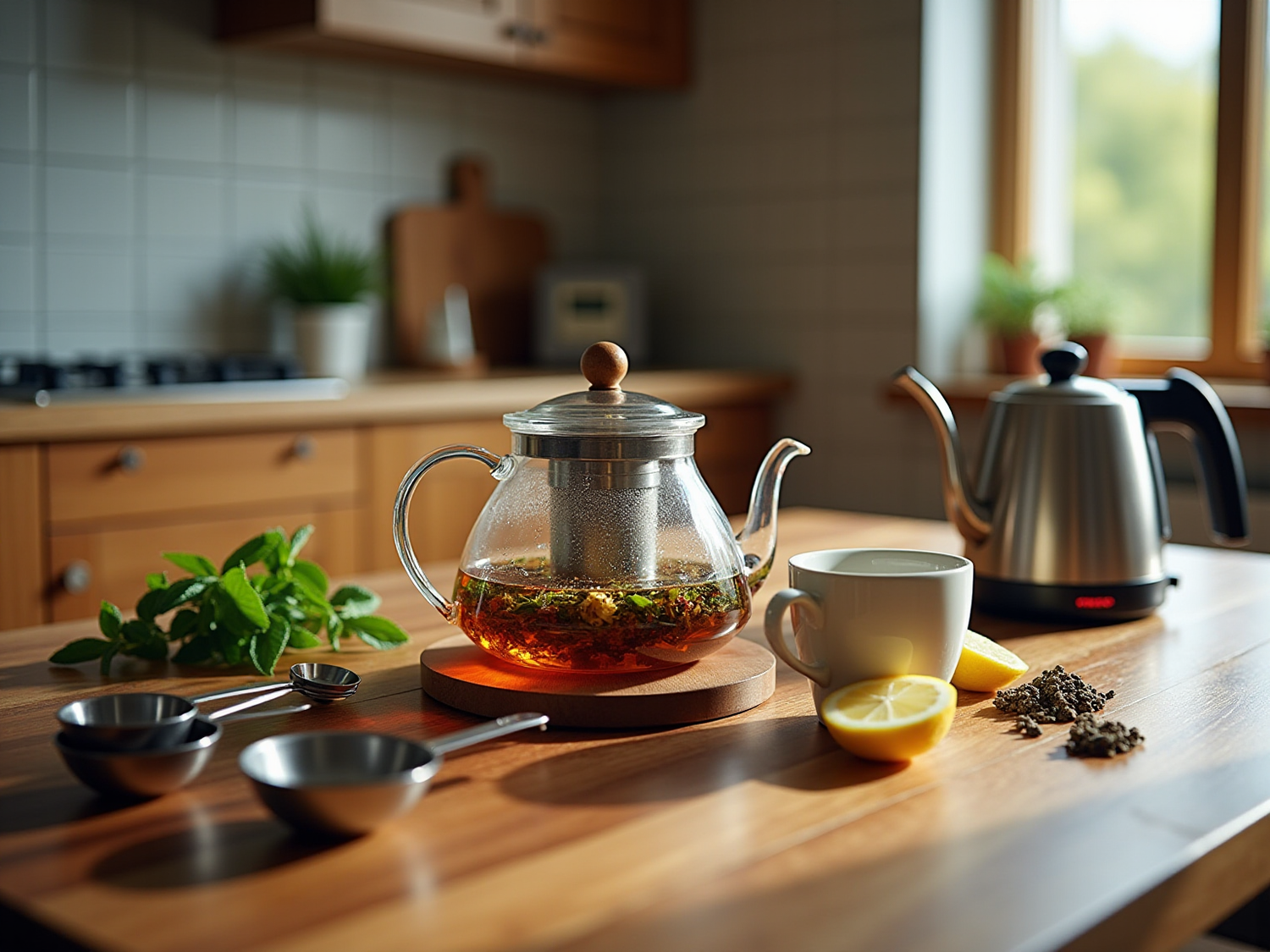
Overview
Brewing loose leaf organic tea is a delightful journey that can be enhanced with the right tools and techniques. Start by gathering quality tea and the essential equipment, as these elements play a significant role in your tea experience. By measuring accurately, paying attention to steeping times, and choosing the right water temperature, you can unlock the full potential of your tea.
Using high-quality ingredients not only elevates the flavor but also brings numerous health benefits. It’s important to avoid common mistakes that can detract from your enjoyment. Moreover, consider incorporating additional flavors to personalize your tea, creating a unique blend that speaks to your taste preferences.
As you embark on this tea-brewing adventure, remember that each step is an opportunity to connect with your wellness journey. Explore the world of loose leaf organic tea, and let each cup nourish your body and soul. Embrace the process, and enjoy the comforting ritual of tea-making, knowing that you are choosing a path toward health and happiness.
Introduction
In the world of tea, the journey from leaf to cup is not just a process; it's an art form that beautifully intertwines tradition, precision, and a touch of personal flair. Are you an enthusiast eager to explore the rich flavors and health benefits of organic loose leaf tea? Understanding the essential tools, techniques, and ingredients is paramount to your experience. This guide gently delves into the intricacies of brewing the perfect cup, highlighting the importance of water temperature, steeping times, and the art of measuring and enhancing flavors.
With insights drawn from research and expert opinions, you'll discover how to elevate your tea experience while embracing the wellness properties that organic blends offer. Imagine savoring each sip, knowing that you're nourishing your body and spirit. Whether you're a seasoned aficionado or a curious newcomer, this comprehensive exploration invites you to transform the way you enjoy tea. So, let’s embark on this delightful journey together!
Essential Tools and Ingredients for Brewing Loose Leaf Organic Tea
To brew loose herbal tea effectively, it's important to gather a few essential tools and ingredients that will support your wellness journey:
-
Loose Leaf Organic Tea: Start by selecting your favorite loose leaf organic tea, such as Tulsi Turmeric Ginger Chai or Earl Grey Lavender. These options are not only delightful in flavor but also packed with unique health benefits.
-
Teapot or Infuser: A quality teapot or tea infuser, like a mesh ball or basket, is crucial for steeping your tea. This tool helps contain the tea leaves, allowing for optimal taste extraction and the full range of health benefits to shine through.
-
Kettle: An electric kettle with temperature control is ideal for boiling water. Achieving the precise temperature for different types of tea can significantly enhance both taste and health benefits, making your brewing experience even more enjoyable.
-
Measuring Spoon: Using a measuring spoon ensures that you incorporate the right amount of tea ingredients. The quantity you use can greatly affect the strength and flavor of your brew, making this tool essential.
-
Timer: A timer is vital for tracking steeping times, as they can vary based on the type of tea. While longer steeping can enhance flavor, it may also increase astringency and caffeine levels. Understanding this balance is key to mastering your tea brewing techniques.
-
Cup or Mug: Finally, have a cup or mug ready for serving your freshly brewed tea.
Utilizing these tools not only streamlines the brewing process but also enriches your overall tea-drinking experience. Studies indicate that high-quality tea infusers and kettles can greatly influence the results, allowing you to appreciate the full spectrum of flavors and health benefits that loose leaf organic tea offers. For instance, recent research revealed that brewing tea can remove approximately 15% of heavy metals from drinking water, underscoring the importance of using quality tea ingredients and proper brewing methods.
As highlighted by research analyst Nisha Deore, the loose leaf organic tea market is growing due to increasing consumer interest in health and wellness, the rising popularity of premium and natural tea varieties, and a broader awareness of traditional tea cultures worldwide. By investing in the right equipment and following effective brewing techniques, you can elevate your tea experience and enjoy the wellness benefits that accompany each cup. Don't forget to explore Gardenika's selection of natural loose infusions to enhance your wellness journey—Shop Now!
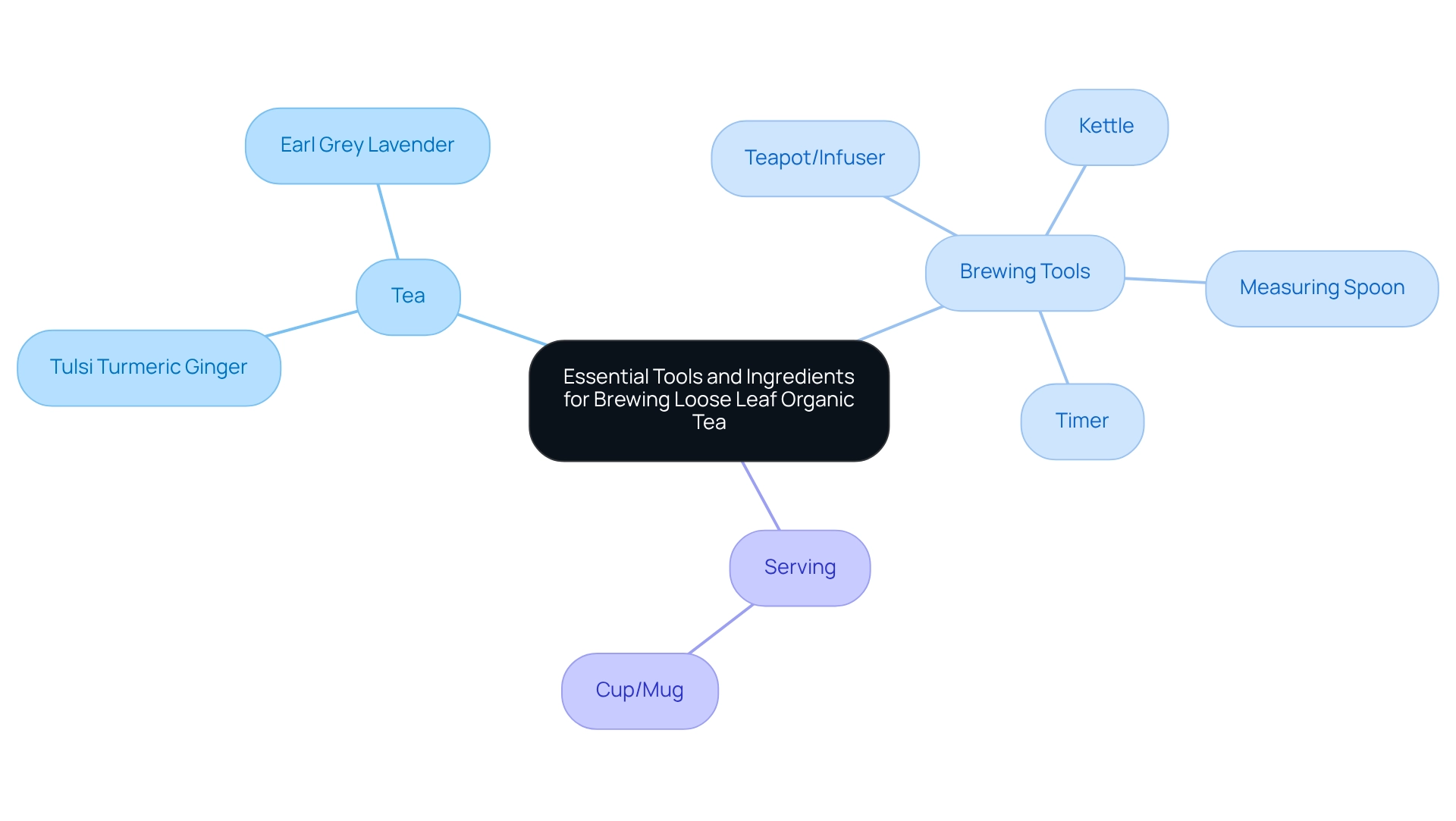
Understanding Water Temperature: The Key to Perfect Brewing
The temperature of the water used for brewing tea plays a crucial role in determining both the taste profile and the health benefits of the final infusion. At Gardenika, we genuinely believe that our natural loose teas, crafted with traditional herbs, can significantly enhance your wellness journey. Here are the optimal brewing temperatures for different types of tea:
- Green Tea: 160°F to 180°F (71°C to 82°C)
- White Tea: 160°F to 185°F (71°C to 85°C)
- Oolong Tea: 185°F to 205°F (85°C to 96°C)
- Black Tea: 200°F to 212°F (93°C to 100°C)
- Herbal Tea: 212°F (100°C)
Utilizing a thermometer or an electric kettle with precise temperature settings can help you achieve the ideal brewing temperature. This ensures that you obtain the complete range of tastes and health advantages from your loose leaf organic tea, promoting relaxation and immune support with every sip.
Research indicates that the choice of water can also influence the sensory properties of tea. A study named 'Multivariate Analysis of Tea Brewing' revealed that using purified water enhances the extraction of catechins, beneficial compounds found in tea, while tap water may yield a sweeter and less bitter taste profile. Notably, catechin content in black tea is reduced by around 85% compared to green tea, underscoring the importance of water quality in maximizing health benefits.
This suggests that for individuals prioritizing health advantages, purified water is advisable, while those who enjoy taste may prefer the appeal of tap water.
As we look ahead to 2025, understanding the optimal water temperature for brewing various types of herbal infusions remains essential for maximizing both flavor and health benefits. For instance, oolong tea has demonstrated the highest antiradical activity at 81% when brewed at 100 °C for 5 minutes, highlighting its potential health advantages. By following these guidelines, tea enthusiasts can relish a more fulfilling and healthy tea experience with Gardenia's premium loose leaf organic tea, including our Ayurvedic blends crafted for relaxation and immune support.
Explore our full range of offerings today! As noted by H.K., funding for this research was provided under the Wild Support System, lending authority to these findings.
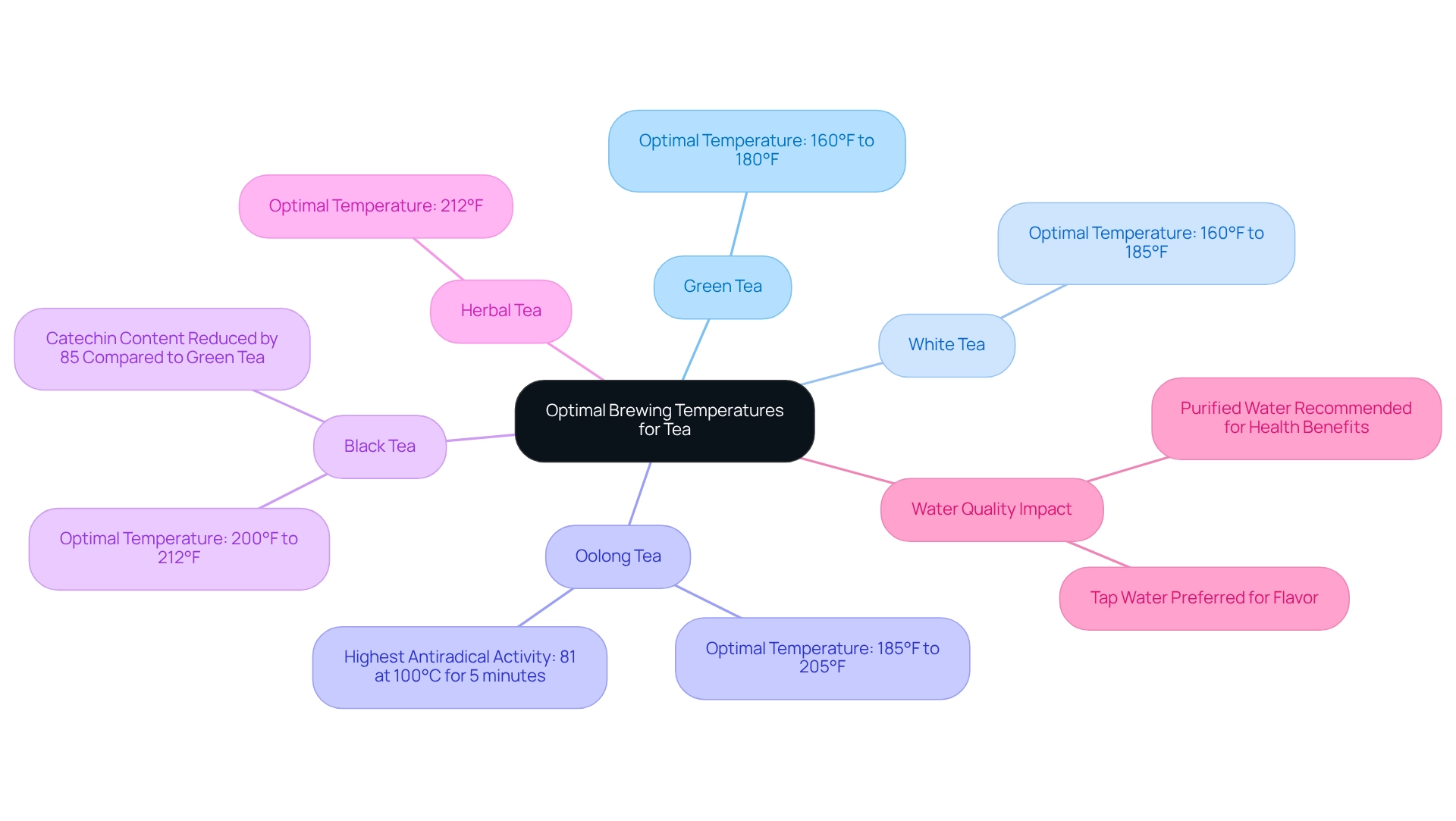
Measuring Tea Leaves: Finding the Right Balance
To achieve the perfect brew of Gardenika's premium organic loose tea, precise measurement is essential. Here are some simple guidelines to help you measure effectively:
- General Rule: Use 1 teaspoon (approximately 2 grams) of loose leaf tea for every 8 ounces (240 ml) of water. This standard measurement offers a balanced taste that emphasizes the unique qualities of Gardenika's blends, especially their loose leaf organic tea, crafted with time-honored herbs for wellness and equilibrium.
- For Stronger Tea: If you enjoy a more intense taste, consider increasing the amount to 1.5 teaspoons. This adjustment allows the tea's natural oils and compounds to infuse more deeply, enhancing your overall experience and supporting your body's natural processes.
- For Lighter Tea: For those who prefer a milder taste, using between 0.5 to 1 teaspoon will yield a gentler brew, perfect for a refreshing afternoon pick-me-up.
Utilizing a kitchen scale can significantly improve precision, especially since different types of tea can vary in density. It's important to note that Gardenika's teas are USDA Organic and Kosher certified, ensuring that you are enjoying high-quality, health-conscious products.
Moreover, professional guidance indicates that regular assessment not only improves taste but also optimizes the health advantages linked to each blend. As Chris Hennes, Director of Operations, shares, "I'm a weigh everything kind of guy but I admit that I have a strong wing-it tendency with tea." This highlights the balance between precision and personal preference in brewing tea.
By following these guidelines, you can ensure that every cup of Gardenika's natural tea you brew is both delicious and beneficial. This enables you to fully appreciate the wellness properties of our offerings, inviting you to explore the delightful journey of tea with us.
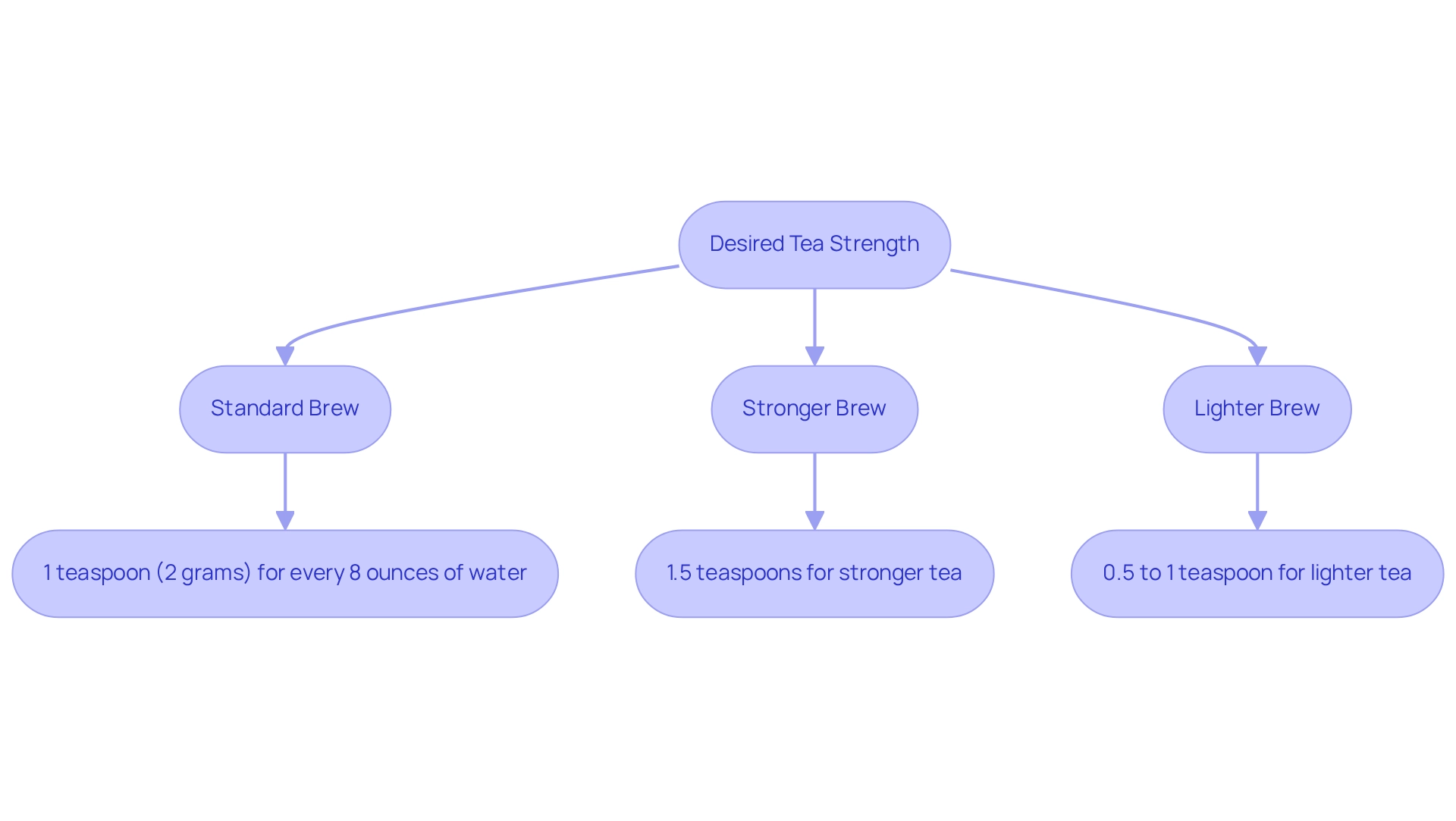
Steeping Times: How Long Should You Brew?
When preparing our loose leaf organic tea, the steeping duration is essential for unlocking the full taste and health benefits of each type. This is especially true when considering the wellness attributes of our organic blends crafted with traditional herbs. To help you on your wellness journey, here are the recommended steeping times for different types of loose leaf tea:
- Green Tea: 1 to 3 minutes
- White Tea: 2 to 3 minutes
- Oolong Tea: 3 to 5 minutes
- Black Tea: 3 to 5 minutes
- Herbal Tea: 5 to 7 minutes
Using a timer can significantly enhance your brewing experience, ensuring you achieve precise steeping times. Remember, adjusting the steeping time to suit your taste preferences can greatly influence the flavor profile of your tea.
While longer steeping durations may yield a more robust flavor, they can also introduce bitterness, particularly in green and black varieties. Research indicates that different tea types showcase varying levels of antioxidant activity, influenced by steeping time. For example, studies suggest that hibiscus tea should steep for at least 5 minutes to maximize its health benefits, aligning with findings from research on tea polyphenols that detail how steeping duration affects antioxidant levels.
For delicate varieties like Jasmine Yin Cloud green and Jasmine Silver Needle white, a shorter steeping duration is recommended—1 to 2 minutes for greens and 2 to 3 minutes for whites—to preserve their subtle nuances. As Gardenika emphasizes, each infusion requires specific steeping times to highlight its unique traits and health benefits. By following these recommendations, you can elevate your tea-drinking experience, savoring both the flavor and the wellness advantages that each blend offers, promoting relaxation and immune support through the natural ingredients in every cup.
Explore our complete selection of natural loose leaf organic tea infusions and discover the perfect blend for your wellness journey.
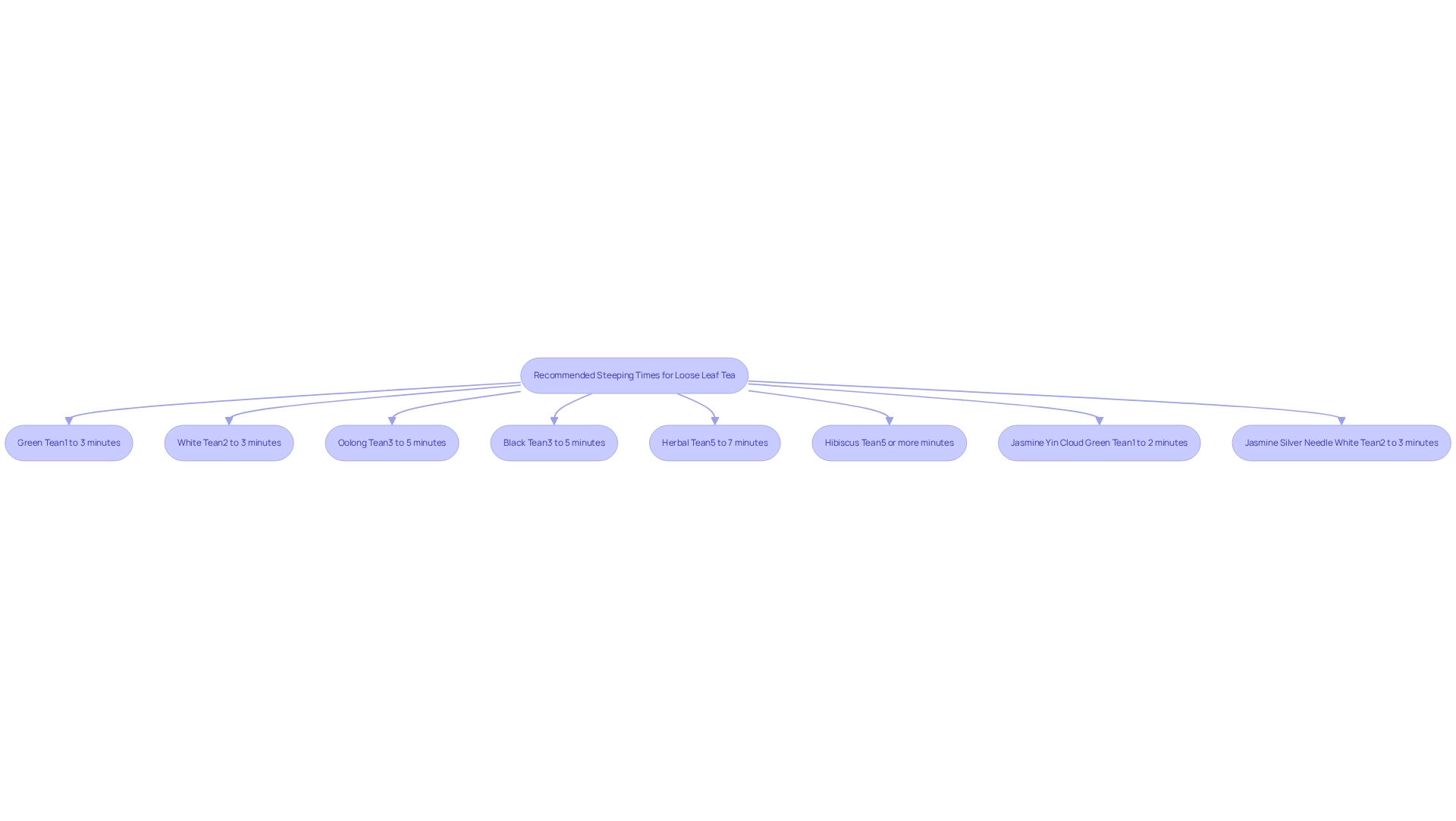
Step-by-Step Brewing Process: A Visual Guide
To brew your loose leaf organic tea from Gardenika perfectly, follow these essential steps that will enhance your tea experience and promote wellness:
- Boil Water: Start by heating your water to the ideal temperature for the specific type of tea you are using. Different types of infusions require distinct temperatures to fully release their taste and wellness benefits.
- Measure Tea Ingredients: Accurately measure the recommended amount of loose tea. A general guideline is one teaspoon per cup, but feel free to adjust this based on your taste preferences. Consider trying Gardenika's premium loose leaf organic tea for a delightful experience that nurtures your senses.
- Add Tea to Infuser: Place the measured tea components into your infuser or directly into your teapot. This step allows for optimal extraction of flavors and beneficial compounds, ensuring each sip is full of goodness.
- Pour Water: Carefully pour the hot water over the tea, ensuring that it is fully submerged. This crucial step promotes even brewing, allowing the tea to express its true character.
- Set Timer: Start your timer according to the recommended steeping time for your tea type. For instance, green teas typically steep for 2-3 minutes, while herbal teas may require 5-7 minutes. Research indicates that longer brewing times can enhance the extraction of polyphenols, but be cautious, as this may also increase bitterness. A study found that brewing temperature and infusion time significantly impact the extraction efficiency of compounds such as polyphenols and methylxanthines, which are essential for the health benefits of tea.
- Remove the Infuser: Once the steeping time is complete, remove the infuser or strain the tea remnants from the pot. This prevents over-extraction, which can lead to astringency and compromise the delicate flavors you’ve worked to create.
- Serve and Enjoy: Pour the brewed tea into your cup and savor the rich flavors and aromas of your natural blend. Notably, evaluated brews have demonstrated several times greater polyphenol levels compared to fresh foliage, highlighting the significance of appropriate brewing methods.
By adhering to these steps, you can maximize the health benefits of your tea while enjoying a delightful experience. Remember, the brewing process can vary slightly depending on the specific tea variety, so feel free to experiment within the recommended guidelines to find your perfect cup. Additionally, as Mr. Lai Hsin-Yong, a doctor and tea connoisseur, notes, "The right brewing techniques can significantly enhance the antioxidant properties of your tea, making each sip not only enjoyable but also beneficial for your well-being."
Discover Gardenika's selection of loose leaf organic tea and Ayurvedic blends to enhance your tea experience. Embrace the journey of brewing with care, and let each cup nurture your body and soul.
Common Mistakes to Avoid When Brewing Loose Leaf Tea
To brew the best cup of loose leaf tea, it's essential to avoid these common mistakes:
- Using Incorrect Water Temperature: Different types of tea require specific water temperatures to unlock their full flavor potential. For instance, green teas typically brew best at lower temperatures (around 160-180°F), while black teas thrive at higher temperatures (around 200-212°F).
- Over-Steeping: Timing is crucial in tea brewing. Over-steeping can lead to bitterness, diminishing the tea's natural flavors. A simplified brewing technique recommends steeping tea for an initial 3 minutes, adjusting according to flavor for subsequent infusions.
- Not Measuring Tea Correctly: The appropriate quantity of tea is essential for achieving the desired strength. Using insufficient leaves can lead to a weak infusion, whereas an excess can overwhelm the taste. A general guideline is to use one teaspoon of loose leaf organic tea per cup of water.
- Using Poor Quality Water: The quality of water significantly affects the taste of your tea. With around 85% of tap water in the United States being hard water, using fresh, filtered water is advised to prevent undesirable mineral tastes that can alter the overall experience.
- Neglecting to Preheat Your Teapot: Preheating your teapot can help maintain the right temperature during brewing, ensuring that the tea steeps evenly and fully. This simple step can enhance the overall flavor profile of your tea.
By avoiding these typical brewing mistakes, you can enhance your tea-drinking experience and fully appreciate the health advantages of your loose leaf organic tea blends. We provide a variety of natural loose herbal infusions, featuring Ayurvedic mixtures such as Tulsi Turmeric Ginger and Earl Grey Lavender, each made with traditional herbs to promote relaxation and immune wellness. As tea expert Cody notes, "With the right water temperature, quality, ratio, and timing, you can elevate your tea experience and enjoy every cup to its fullest."
Integrating these practices will not only enhance the flavor but also elevate the overall pleasure of your ritual, enabling you to experience the holistic wellness that Gardenika's organic beverages offer. Shop now to discover the perfect blend for your wellness journey.
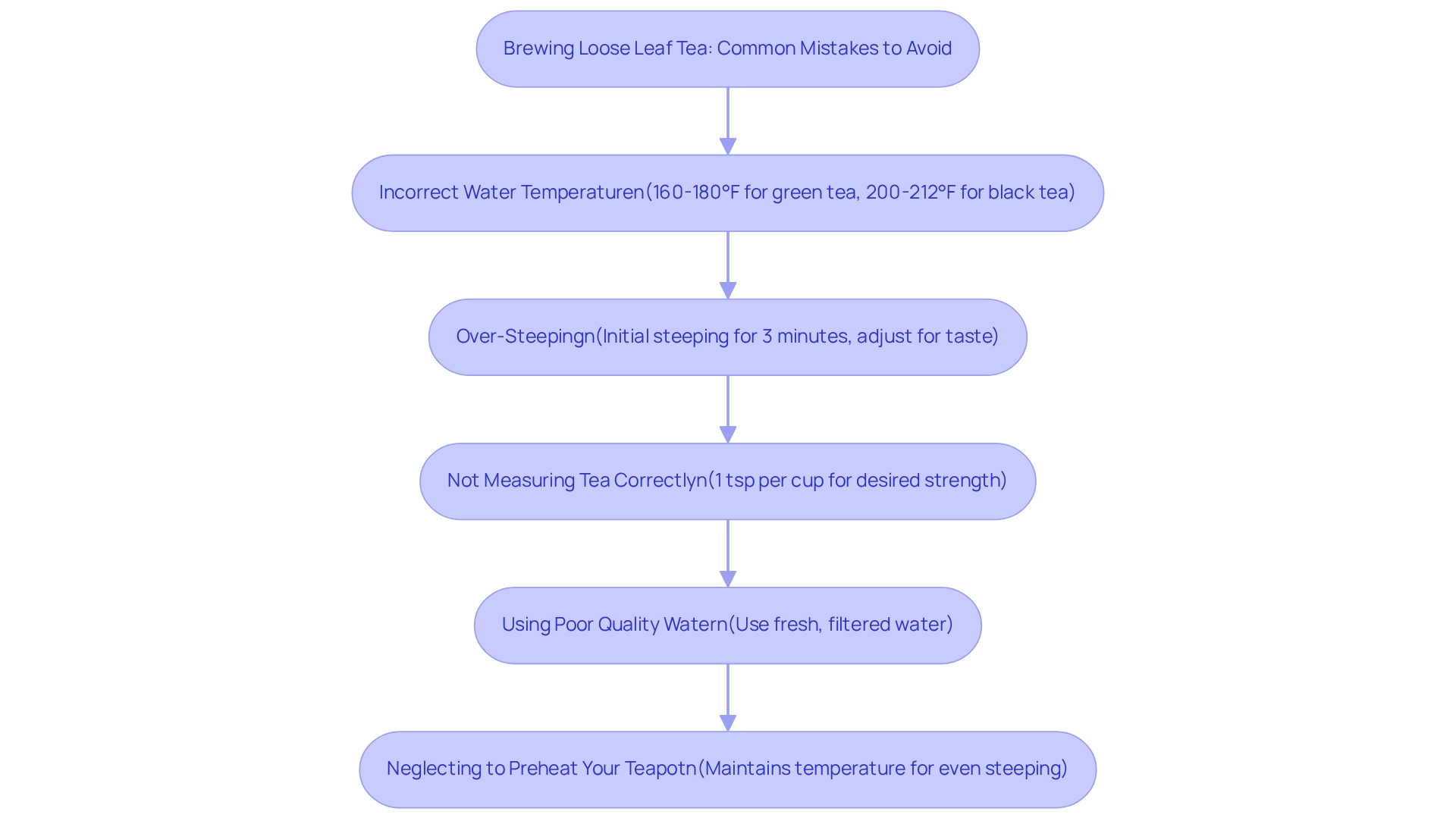
Health Benefits of Organic Loose Leaf Tea: Why Choose Organic?
Loose leaf organic tea offers a wealth of health benefits, making it an excellent choice for those looking to enhance their wellness journey. Here are some key advantages:
- Rich in Antioxidants: Organic teas are abundant in antioxidants, which play a crucial role in combating oxidative stress and reducing the risk of chronic diseases. Research has shown that the polyphenolic compounds found in tea, such as catechins in green tea and theaflavins in black tea, are particularly effective in promoting health, including anti-aging and anti-diabetic effects. A case study elaborates on these compounds, emphasizing their physiological benefits.
Choosing loose leaf organic tea ensures that you are drinking a beverage free from harmful pesticides and synthetic fertilizers. This commitment to purity not only benefits your health but also supports sustainable agricultural practices.
Moreover, the quality of loose leaf organic tea frequently leads to a richer and more intricate flavor profile. This is due to the careful cultivation and processing methods that prioritize the integrity of the tea leaves, providing a more enjoyable drinking experience.
- Supports Wellness: Many natural teas, such as Gardenika's Tulsi Turmeric Ginger and Anti-Inflammatory blends, are specifically formulated to promote relaxation, aid digestion, and enhance overall well-being. These blends are crafted with Ayurvedic principles, utilizing time-tested herbs known for their health benefits. Customer testimonials frequently highlight improvements in health and wellness after incorporating these blends into their daily routines. For instance, Hillary shared, "I wasn’t expecting much from a tea beyond tasting good and this tea does that, but after drinking it at night I woke up the next morning feeling so good and the least bloated I have in ages."
In addition to these advantages, research shows a rising consumer inclination for natural tea, fueled by a heightened awareness of health benefits linked to natural products. For instance, a cohort study involving over 29,335 Finnish subjects revealed a correlation between tea consumption and a reduced incidence of Parkinson's disease, underscoring the potential protective effects of tea.
Enhancing Your Brew: Adding Flavors and Ingredients
To elevate your loose leaf tea experience with Gardenika's premium offerings, consider incorporating enhancements that truly promote wellness and balance:
- Fresh Herbs: Imagine adding herbs like mint, basil, or rosemary to your tea. This simple step infuses your drink with a refreshing twist, enhancing both aroma and flavor. Gardenika's loose leaf organic tea blends are beautifully crafted to complement these additions, supporting your body's natural processes and promoting relaxation.
- Citrus: A slice of lemon or orange can do wonders. Not only does it enhance the taste profile, but it also adds a zesty freshness that complements various tea blends, making each cup a delightful experience while promoting hydration and wellness.
- Spices: Have you tried introducing spices such as cinnamon, ginger, or cardamom? These can impart warmth and depth, creating a more complex and satisfying cup. Many tea enthusiasts have shared that such enhancements significantly improve their overall enjoyment, aligning with holistic wellness practices and supporting immune health.
- Sweeteners: For those who enjoy a hint of sweetness, natural sweeteners like honey or agave syrup can enhance the flavor without overpowering the tea's natural qualities. This allows for a balanced taste that aligns with health-conscious choices and supports relaxation.
- Milk or Cream: If you prefer a creamier texture, consider adding a splash of milk or a non-dairy alternative. This transforms your tea into a rich, comforting beverage, further enhancing your tea-drinking experience.
Experimenting with these additions not only personalizes your tea experience but also aligns with current consumer trends favoring unique taste combinations. As a leader in the organic tea market, Gardenika appeals to health-conscious consumers seeking premium loose leaf organic tea options, as evidenced by over 2000 five-star reviews from satisfied customers. Moreover, advancements in tea production, like those examined in the case study on automation in black tea fermentation, emphasize the potential for improving taste through advanced techniques.
Sensory evaluations and various analytical techniques employed to assess tea quality offer a scientific foundation for these taste enhancement recommendations. As Laura Vázquez-Araújo notes, "The exploration of flavor in tea is not just about taste; it's about creating an experience that resonates with individual preferences and wellness goals." By exploring these options, you can craft a tea experience that is uniquely yours, reflecting your individual preferences and wellness aspirations.
Shop now to discover Gardenika's loose leaf organic tea and experience the benefits of our Ayurvedic blends for relaxation and immune support.
Conclusion
The journey of brewing the perfect cup of organic loose leaf tea is not just a task; it’s an intricate blend of art and science, enriched by quality tools, precise measurements, and mindful techniques. By thoughtfully selecting the right loose leaf tea and utilizing essential equipment like an electric kettle, measuring spoons, and a timer, tea enthusiasts can unlock a delightful array of flavors and health benefits. Each variable—from water temperature to steeping time—plays a pivotal role in enhancing the tea experience, ensuring that every sip contributes to your overall wellness.
Choosing organic tea supports your personal health by providing rich antioxidants while steering clear of harmful chemicals. Moreover, it aligns beautifully with sustainable practices that benefit our environment. Our commitment to quality and health shines through in its Organic and Kosher certified offerings, catering to a growing demand for natural products. The incorporation of fresh herbs, spices, and natural sweeteners further personalizes your tea experience, inviting exploration and creativity in every brew.
Ultimately, the art of brewing organic loose leaf tea is a rewarding endeavor that fosters mindfulness and promotes well-being. By embracing the guidelines outlined in this guide, anyone—from the curious newcomer to the seasoned aficionado—can elevate their tea ritual, savoring not just the flavors but also the holistic health benefits that accompany each cup. The journey toward a more enriching tea experience begins with a single brew—so why not explore, experiment, and enjoy the delightful world of organic loose leaf tea?
Frequently Asked Questions
What essential tools are needed to brew loose herbal tea effectively?
To brew loose herbal tea effectively, you need the following tools: loose leaf organic tea, a teapot or tea infuser, a kettle (preferably electric with temperature control), a measuring spoon, a timer, and a cup or mug for serving.
Why is loose leaf organic tea recommended?
Loose leaf organic tea, such as Gardenika's Tulsi Turmeric Ginger or Earl Grey Lavender, is recommended because it offers delightful flavors and unique health benefits. Gardenika's teas are USDA Organic and KSA Kosher certified, ensuring quality and wellness contributions.
How does a kettle with temperature control enhance tea brewing?
An electric kettle with temperature control allows you to achieve the precise temperature needed for different types of tea, which can significantly enhance both the taste and health benefits of the brew.
What role does a measuring spoon play in brewing tea?
A measuring spoon is essential for incorporating the right amount of tea ingredients, as the quantity used can greatly affect the strength and flavor of the brew.
Why is a timer important when brewing tea?
A timer is vital for tracking steeping times, which can vary based on the type of tea. Proper timing helps balance flavor and astringency, ensuring an enjoyable tea experience.
What are the optimal brewing temperatures for different types of tea?
The optimal brewing temperatures are as follows: Green Tea: 160°F to 180°F (71°C to 82°C), White Tea: 160°F to 185°F (71°C to 85°C), Oolong Tea: 185°F to 205°F (85°C to 96°C), Black Tea: 200°F to 212°F (93°C to 100°C), Herbal Tea: 212°F (100°C).
How does water quality affect tea brewing?
Using purified water enhances the extraction of beneficial compounds like catechins, while tap water may yield a sweeter and less bitter taste profile. The choice of water can significantly influence the sensory properties of tea.
What are the health benefits of brewing tea at the correct temperature?
Brewing tea at the correct temperature maximizes the range of tastes and health benefits, promoting relaxation and immune support with every sip. For instance, oolong tea brewed at 100°C for 5 minutes has shown high antiradical activity.
What is the significance of investing in quality brewing tools?
Investing in quality brewing tools, such as high-quality tea infusers and kettles, can greatly influence the results of your tea, allowing you to appreciate the full spectrum of flavors and health benefits that loose leaf organic tea offers.
